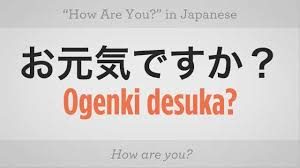“How are you?”
These past few weeks when asked how I am, I’ve been struck by how easy it is to fall back on that socially acceptable, “Fine, thanks. How are you?” It’s the polite response, we say here in the US. And, by definition, it’s also the superficial response. Sometimes, it’s the only response we can muster. Sometimes, it’s all that’s expected of us. And sometimes, we need more.
It’s a universal question — How are you? — so I’ll weave a few international translations throughout, just for your traveling pleasure. Still, I feel serious about this topic.

“How are you?”
The question sometimes carries a bit of baggage. It can come across as intrusive, when the last thing you want to tell the person who asked it is the truth. But, in the right setting, at the right time, when asked by someone genuinely interested and received accordingly, this simple question can be the entrée to a moment of human connection vital to our mental health.
There is a mental health crisis in this country at the moment. Suicide rates have been steadily increasing for nearly the past twenty years. And from every source I find, I hear the same tale that too many are suffering in silence. Besides, September is Suicide Prevention Awareness Month (and September 10 – 16 was Suicide Prevention Week).

How are you?
In sign language, the movement is from the heart, literally. The hands move up, over the heart, and then outward, toward the other.
So there’s heart involved. It’s your heart I’m interested in when I ask “How are you?” Is your heart dancing for joy? I’d like to hear your good news. Is your heart heavy? Is it broken today? You can tell me about that too.

Yes, it takes energy to listen to sad tales. And it takes time. But this is the kind of connection we must strive to make these days, as our world seems to spin off its axis. Besides, do we really want to be so busy that we can’t listen? That we can’t care?
When asked “How are you?” do you rush into “Fine thank you, and you?” If you slowed down and thought about it, what might be closer to the truth? And, if you did give it that extra thought, would you be willing to divulge that truth? There is no right answer, you know. No wrong answer either.
Would you be willing to listen as someone tells you, really, how they are? What a gift that would be.
It’s not just the mentally ill that need us to reach out (and I’m in the camp that uses that term sparingly). The “normally dysfunctional,” like you and I, need it too. We need to reach out to each other. We need to hear “How are you?” from our neighbors, our co-workers, our friends. And they need to hear it from us.
How much thought have you given these three one-syllable words?
How are you?

How about you? What does “how are you” mean to you?

- Call the National Suicide Prevention Lifeline at 1-800-273-8255 to speak to a trained counselor in your area, or text 838255 for immediate help.
- Text 741741 when you are feeling really depressed or suicidal, and a crisis worker will text with you. Many people do not like talking on the phone and would be more comfortable texting. It’s a free service run by The Crisis Text Hotline
- For more information on suicide prevention, visit the National Alliance on Mental Illness’s website for more info: https://www.nami.org/Find-Support/Family-Members-and-Caregivers/Preventing-Suicide.
[box] Interested in reading At Home on the Kazakh Steppe? I hope so.
Click here for the PAPERBACK and eBook versions.
Amazon makes it easy. And, you can always order it from your local independent bookstore.
If you’ve read it, and enjoyed it, a review on Amazon would be much appreciated. [/box]
Carolyn
We were all brought up in the 50s and 60s, I guess, to maintain the stance of politeness and not burdening people with our worries. I heard on the UK radio this morning that teenagers here are suffering more mental health problems, especially depression. However, I think the research has overlooked the simple fact that nobody mentioned all their pains: nobody asked teenagers if they were depressed in the past. It is much better that people are in a position to answer the question honestly now but the polite answers of the past may be hiding a world of pain for the elderly who are still saying “Fine, thank you”.
Janet Givens
Thanks Carolyn. It’s something I’ll pay better attention to next time I sing in our local “rehab center” (the latest euphemism for what we used to call a nursing home).
Tracy Lee Karner Rittmueller
My focus word this year has been Listen! It encompasses so much that it could become a focus word for life. To treat people in the moment with reverence requires that I simply listen, which is to esteem the unique life that I encounter in the moment and to give that person priority over my time and preoccupations for a few minutes.
I’m amazed at how significantly my life has altered by working to acquire this habit. I’ve always wanted to “help” people, which can inadvertently turn into an impulse to meddle or become codependent. But by simply listening, (without giving advice or jumping in to do something) I give them the “help” they’re really looking for–a validation that they matter, without inadvertently violating boundaries.
Of course there are times when doing something is required, but if we listened more intently to others every day, perhaps some of those crises wouldn’t happen.
Tracy Lee Karner Rittmueller recently posted…Trashing My Brand: in rejection of the insane trend toward the monetization of everything
Janet Givens
Thanks, Tracy. That pull towards codependency is a strong one, I know. Your comment is a good reminder of the Serenity Prayer — and that “wisdom” to know the difference. Listening to each other is critical. I love that it’s your focus word. Mine is “vigilance,” which is a great word for a week or a day or an hour. Not for a year!
Laurie Buchanan
Janet — More than important, this is a VITAL topic and I’m so glad you wrote a blog post about it (and took us on a global tour, to boot).
I also enjoyed reading that Tracy’s focus word this year has been LISTEN.
We can all make a practice to listen not only to what’s being said, but (sometimes even more importantly) to what’s NOT being said.
Laurie Buchanan recently posted…Book Fairies
Janet Givens
An important addition, Laurie. Thank you.
Tim Fearnside
Hi Janet. I’ve never really liked the “how are you,” “how ‘ya doin’,” “how’s it going” – type questions. They’re almost never asked in a context where an honest answer would be appropriate, or a meaningful conversation might ensue. They’ve become almost meaningless expressions — just another way for strangers to say essentially say “hello.” Even in more social or intimate environments, these types of questions rarely seem to get a good conversation going. “How’s life?,” How’re the kids?” “Great, good, everyone’s well,” etc. I very much agree that we need to be better listeners, and to engage in deeper and more honest dialogue with others. Perhaps asking better, more thoughtful questions can help us get there.
Tim Fearnside recently posted…On the Human Chains that Bind Us
Janet Givens
Perhaps it’s like “I love you,” from the Mars – Venus book: Some husband’s can only say “I love you” by washing their wife’s car.
So too, there are many ways to ask “How are you,” in a genuine and caring way. I heard it just last week after my “Overwhelm” post in a private email. And I appreciated it very much.
Thanks for your thoughts.
Kathleen Pooler
Janet, I think Tracy’s commitment to listening strikes at the core of your question about the meaning of the phrase, “how are you?” Real listening is hard work and requires a concerted effort. We all want to be heard and I agree, we’d all be better off if we paid attention to a person’s response to “how are you”.Thanks for this reminder to say it like you mean it not just say it as a matter of habit as you fly by, as I’ve done.
Janet Givens
Oh yes, Kathy. And such a deep seated habit it is. Just tonight I found myself responding, “I’m well, thank you. And you?” But when I ask it in the sense I mean here, I do so with genuine interest, care, so it never seems hard. I’m going to pay attention more to when I ask it; I’m guessing I do so more judiciously than I’d realized.
And following up on Tim’s comment, the question does seem to lead two separate lives: the purely social, polite conversation starter. And the deeper, slower, more serious connection starter. Hmmm. We should have talked before I posted this one.